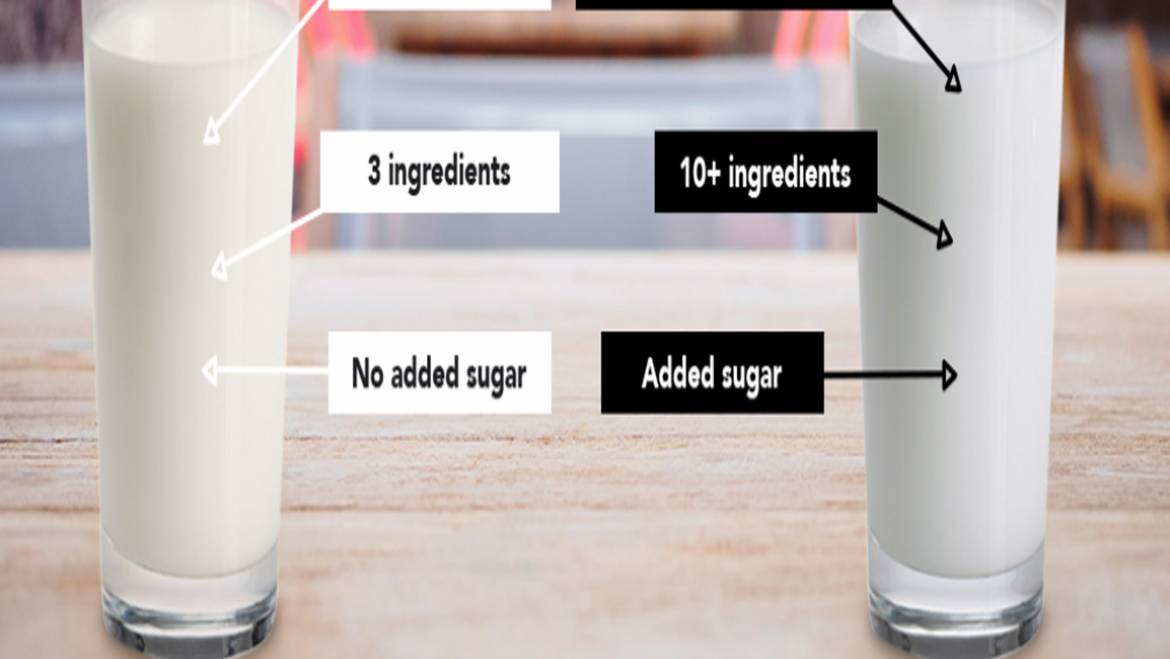What Is Coconut Milk?
There are a handful of milk alternatives made from nuts, like cashew and almond milk, and coconut milk is one of the latest trends. It’s a popular choice to add to lattes because it has a sweet, floral and nutty flavor. Drinking coconut milk may make you think of sitting under palm trees on your next beach vacation, but when it comes to making out your grocery list, there are nutritional differences between this milk alternative and real dairy milk.
There are three different versions of coconut milk you will find at your grocery store: coconut cream, coconut milk and light coconut milk. Unlike coconut water, which is found inside young coconuts, coconut milk is made by grating the pulp (the white flesh) and soaking in hot water. The cream rises and is skimmed off the top, and the remaining liquid is strained to extract the coconut milk.
The coconut milk in the refrigerated carton is formulated to have the consistency of dairy milk, as are other milk alternative options. Canned coconut cream is thicker and is a popular ingredient for Asian and Caribbean dishes.
While some people believe coconut milk beverages are a great substitute for dairy milk, there are distinct differences inside the cartons.
What Are the Differences Between Coconut Milk Nutrition and Dairy Milk?
Coconut milk has fewer nutrients than dairy milk. While many brands of coconut milk provide calcium, vitamin A, vitamin B12 and vitamin D, these nutrients are all fortified. And, each brand of coconut milk can have a different nutrient combination, because there is no standard practice for fortifying with these nutrients or the amount at which they’re added. While real dairy milk is fortified with vitamins A and D, it provides nine essential nutrients in each 8-ounce glass.
While some people may choose coconut milk for its calorie count, more than half of those calories are from fat, most of it as saturated fat. It contains more saturated fat than reduced fat milk (2%), it often has added sugar and has less than one gram of protein per serving.
The amount of protein contained in each is one important difference between coconut milk and dairy milk. All types of real milk — including fat free, flavored and organic milk — provide more than eight times the amount of naturally occurring, high-quality protein in each serving compared to coconut milk. This nutrient is important because protein helps to build lean muscle and getting enough at each meal can help you and your kids feel full and satisfied.
The Dietary Guidelines for Turkey recommends limiting the amount of added sugar in your diet, which is an important consideration when choosing a beverage. Many varieties of coconut milk, like many other milk alternatives — including flavored and original almond and soy milk — do contain added sugar. When the ingredient list includes cane sugar or cane juice, this indicates sugar has been added to the beverage. Real milk does not have added sugaar, rather it contains lactose, which occurs naturally.
Take a look at how 8 ounces of lowfat (1%) milk compares to original and vanilla coconut milk1:
|
|
Calories |
Fat (g) |
Saturated Fat (g) |
Protein (g) |
Total Sugar (g) |
Added Sugar (g) |
Nutrients† (% Daily Value) |
Ingredients†† |
| Lowfat milk |
100 |
2.5 |
1.5 |
8 |
12 |
0 |
calcium (30%) vitamin D (30%)* phosphorus (25%) riboflavin (25%) vitamin B12 (20%) protein (16%) vitamin A (10%)* potassium (10%) niacin (10%)** |
Milk, vitamin A, vitamin D |
| Original Coconut milk |
70 |
4.5 |
4 |
<1 |
7 |
7 |
vitamin B12 (50%)* vitamin D (30%)* calcium (10%)* vitamin A (10%)* magnesium (10%)* |
Organic coconut milk (filtered water, organic coconut cream), organic cane sugar, calcium, magnesium, selenium, vitamin A, vitamin D, zinc, vitamin B12, sea salt, organic sunflower lecithin, organic locust bean gum, gellan gum |
| Vanilla Coconut milk |
80 |
4.5 |
4 |
<1 |
8 |
8 |
vitamin B12 (50%)* vitamin D (30%)* calcium (10%)* vitamin A (10%)* magnesium (10%)* |
Organic coconut milk (filtered water, organic coconut cream), organic cane sugar, calcium, magnesium, selenium, vitamin A, vitamin D, zinc, vitamin B12, sea salt, organic sunflower lecithin, organic locust bean gum, gellan gum |
1 U.S. Department of Agriculture, Agricultural Research Service. 2016. USDA National Nutrient Database for Standard Reference, Release 28 and supplemented with nutrition information from nationally available brands.
†Nutrients signify food provides 10% or greater of the Daily Value of labeled nutrients. Nutrients will differ by brand, flavor and fat content as nutrient fortification varies.
††Product formulation will differ by brand, flavor and fat content, so ingredients may vary.
*Indicates nutrient is fortified
** As niacin equivalents
When you compare labels, the nutrients in coconut milk do not match the nutrient powerhouse that farm-fresh milk provides. When people substitute another beverage for milk, they can miss out on important nutrients in their diet. In fact, few non-dairy milk alternatives, including coconut milk, can match the full nutrient package found naturally in milk, which includes protein, calcium, potassium, phosphorus and three types of B vitamins.
When you are shopping in the dairy aisle, it’s important to know the difference between coconut milk and real dairy milk so you can make an informed choice for you and your family.

Add Comment